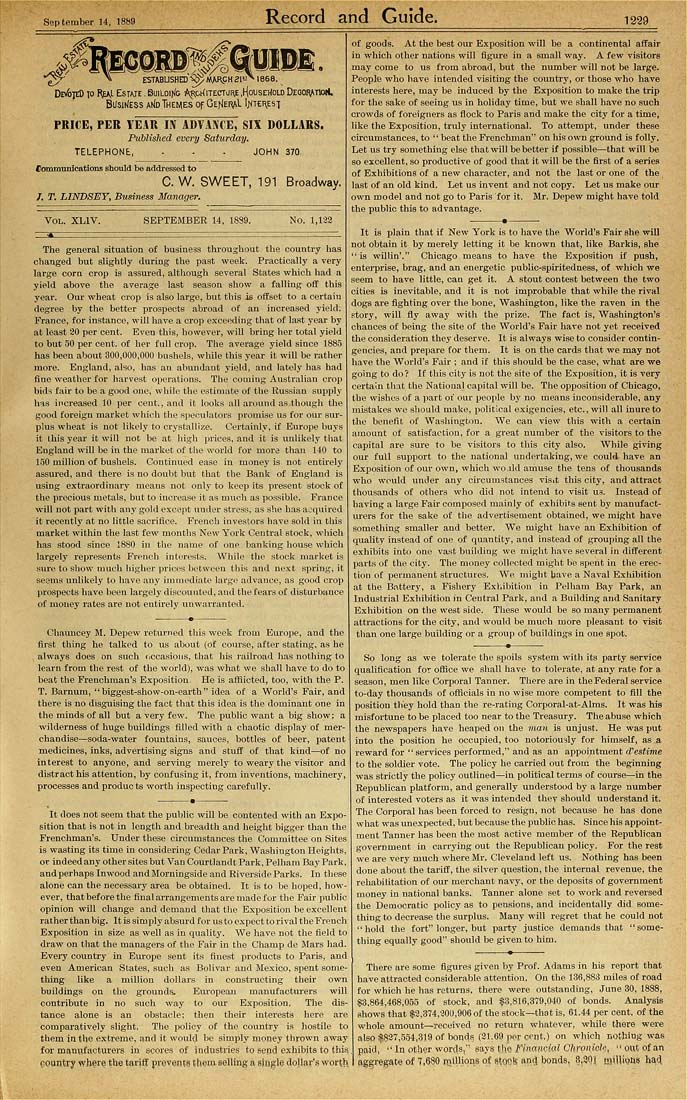Columbia University Libraries Digital Collections: The Real Estate Record
Use your browser's Print function to print these pages.
Real estate record and builders' guide: v. 44, no. 1122: September 14, 1889

Text version:
Please note: this text may be incomplete. For more information about this OCR, view About OCR text.
September 14, 18b9 Record and Guide. 1229 *^r ^ estabusheii*-^'march21'-^ ____^ Dev&ieD to Re\L Estme , BuiLoij/o Ajt.ciart oi our people by no meaus inconsiderable, any mistakes w-c should make, political exigencies, etc., will all inure to tho benefit of Washington. We can view this with a certain amount of satisfaction, for a great uumber of the visitors to tbe capital are sure to be visitors to this city also. While giving our full support to the national undertaking, we could have an Exposition of our own, which woald amuse the tens of thousands who would under any circumstances visit this city, and attract thousands of others who did not intend to visit us. Instead of having a large Fair composed mainly of exhibits sent by manufact¬ urers for the sake of the advertisement obtained, we might have something smaller and better. We might have an Exhibition of quality instead of one of quantity, and instead of grouping all the exhibits into one vast building we might have several in different parts of the city. The money collected might be spent in the erec¬ tion of permanent structures. We might have a Naval Exhibition at the Battery, a Fishery Exhibition in Pelham Bay Park, an Industrial Exhibition in Ceutral Park, and a Building and Sanitary Exhibition on the west side. These would be eo many permanent attractions for the city, and would be much more pleasant to visit __ than one large buildiug or a group of buildings in one spot. It does not seem that the public will be contented with an Expo¬ sition that is not in length and breadth and height bigger than the Frenchman's. Uuder these circumstances the Committee on Sites is wasting its time in considering Cedar Park, Washiugton Heights, or indeed any other sites but Van Courtlandt Park, Pelliam Bay Park, and perhaps Inwood andMorningside and RiversideParks. In these alone can the necessary area be obtained. It is to be hoped, how¬ ever, that before the final arrangements are made for the Fair ]niblic opinion will change and demaud that tlie Exposition be excellent rather than big. It is sim ply absurd for us to expect to rival the French Exposition in size as well as iu quality. We have not the field to draw on that the managers of the Fair in the Champ de Mars had. Evei-y country in Europe sent its finest products to Paris, and even American Sl:ates, such as Bolivar and Mexico, spent some¬ thing like a million dollars in constructing their ovm buildings on the grounds^ European manufacturers will contribute in no such way to om' Exposition, The dis¬ tance alone is an obstacle: then their interests here are comparatively slight. The policy of the country is hostile to them iathe extreme, and it would be simply money thrown away for manufacturers in scores of industries to mM exhibits to thisi country s\'here the tariff prevenrti fliem selling a sioj^'le dollar's worth So long as we tolerate the sjioils system with its party service qualification for office we shall have to tolerate, at any rate for a season, men like Corporal Tanner. There are in the Federal service to-day thousands of officials in no wise more competent to fill the position they hold than the re-rating Corporal-at-Alma. It was hie misfortune to be placed too near to the Treasury. The abuse which the newspapers have heaped on the man is unjust. He was put into the position he occupied, too notoriou'sly for himself, as a reward for "services performed," and as an appointment d'esiime to the soldier vote. The policy he carried out from the beginning was strictly the policy outlined—in political terms of course—in the Republican platform, and generally understood by a large uumber of interested voters as it was intended they should understand it. The Corporal has heen forced to resign, not because he has done what was imexpected, but because the public has. Since his appoint¬ ment Tanner has been the most active member of the Republican government iu carrying out the Repubhcau policy. For the rest we are very much where Mr, Cleveland left us. Nothing has been done about the tariff, the silver question, the internal revenue, the rehabilitation of our merchant navy, or tbe deposits of government money in national banks. Tanner alone set to work and reversed the Democratic policy as to pensions, and incidentally did some¬ thing to decrease the surplus. Many will regret that he could not "hold the fort" longer, but party justice demands that "some-,.^ thing equally good" should be given to him. ^H There are some figures given by Prof. Adams in his report that have attracted considerable attention, On the 136,883 miles of road for which he has returns, there were outstandmg, June 30, 1888, §3.864,468,055 of stock, and $3,816,379,040 of bonds. Analysis shows that $2,374,-300,906 of the stock—that is, 61.44 per cent, of the whole amount—received no return whatever, while there were alsQ 1837,554,319 of bonds (21.69 per c^nt,) on which nothing was paid, ''In other words,"' eays the ,,f'ina?ic?'o? Oftrp'Hc?^, ■'outofan aggregate of 7,680 raiUions of m^^ anrl. bonds, S,30| mUVi^HU ha(i